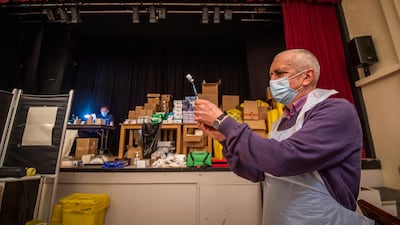The UK should introduce vaccine passports to avoid future chaos, former prime minister Tony Blair said on Friday.
Mr Blair was speaking after his institute launched a new report, The New Necessary, which details how the world can better prepare for the next pandemic by putting into place new global health infrastructure.
He said after the worst of the current crisis is over it is “common sense” to assume that both businesses and individuals will want to know someone’s Covid-19 status.
“To me, that’s not unreasonable,” he told the Institute of Government.
“It’s going to be common sense. Just put the system in place, otherwise you’ll find it grows topsy-turvy with no control over it at all.”
The UK government is currently reviewing whether Covid certificates should be distributed for use in the domestic economy.
Prime Minister Boris Johnson has said there are ethical issues with such a scheme, but Mr Blair predicted people will want to feel safe before attending an event with large groups of people.
“I think you’re going to find venues with large numbers of people who congregate close to each other, they will want to have rules around it,” he said.
“People will feel more comfortable if there is some requirement - if not vaccinated, at least tested before they arrive.”
Asked about the potential for unvaccinated people to be barred from venues, Mr Blair said: “You’ve got to decide what to do about that. You might decide you’ve got to at least be tested - it’s in the interest of other people that you at least take some precautions to ensure people are not carrying the disease.”
The UK has administered nearly 20 million doses of a Covid-19 vaccine, according to government statistics.
Earlier, the former prime minister said the length of the pandemic could have been cut by three months if the framework was in place to develop vaccines faster.
The former prime minister said the UK should take the lead in developing new “health security infrastructure” to prevent future pandemics.
“Had there been global co-ordination a year ago, I think we could have shaved at least three months off this virus,” he said.
Mr Blair’s institute argued that new vaccines could be developed in as little as 100 days if international co-ordination and investment was overhauled.
He said a global data system should be put in place to identify “health hotspots anywhere in the world”.
“The time that it’s taken for us to identify the virus, to develop a vaccine and to get it into production and distribution has been roughly 15 months. And the result of that has been that the world has suffered a huge, catastrophic economic event as well as a health event,” he said.
“The obvious lesson to draw for the future is, number one, you have to prepare for the potential of this happening again, or with different variants of this particular virus. And number two, you cannot afford to take this long to get on top of it.”
The report called on the government to treat new diseases as potential security threats that require a response “akin to a military operation”.
Mr Johnson was criticised for skipping several Cobra meetings in the early days of the pandemic, leaving them to be chaired by Health Secretary Matt Hancock.
Mr Blair also admitted to underestimating the threat of emerging health threats during his time in office. He wrote in his memoir that he did "the minimum" and with "the minimum expenditure" to prepare for the bird flu outbreak.
“The thing I didn’t understand then was this concept that we've near-misses in the past,” he said.
“We regarded Sars and Mers [respiratory illnesses] as something happening in Asia, barely hitting our consciousness.
“For them, this really was a near-death experience and they learnt a a lot of lessons from that and were better prepared.”









